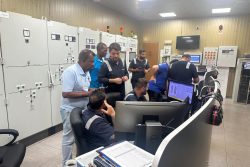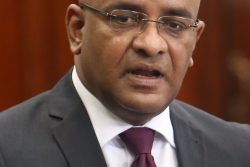In recent weeks a variety of suggestions have arisen for modernising voting on polling day so that ostensibly the casting of a ballot will occur faster and results will be made available quicker. These proposals have included the use of electronic fingerprints at the place of poll on the day of the elections and electronic voting.
Some of the proposals have clearly come from observers who are interested in a more efficient process that is now de rigueur in more developed societies and work very well with little to no confusion or disruption.
There are two major problems with all of these proposals in this part of the world. The first is straightforward but significant. Given the shaky state of Guyana’s power company it will be impossible to guarantee electricity supply to more than 2,000 polling stations scattered all across the country on the day of voting. This could lead to endless disruption of voting and allegations of the type that outages were being deliberately targeted at certain communities. Today, even if there was to be a blackout, voting could still proceed and at the worst counting would be done by lamplight or some simple battery-operated device.
Allied to this problem are the legendary inefficiencies preponderant in all parts of life in this country coupled with logistics challenges. It would not be surprising to hear that the electronic fingerprint machines had not been delivered to all polling stations or were not coming on when powered up. Then what next? Or that polling day staff had not been trained on the proper use of the machines. Depending on the type of electronic voting all types of issues could arise: the punched card devices don’t work – leading to the hanging chad syndrome – the requisite software wasn’t properly loaded or had suddenly become corrupted or infected by malware and it goes on endlessly. The nightmares are too many to contemplate. There may come a time when efficiencies across the board permit such advances but it is not now or next year or even in the next decade because of the other major problem that afflicts elections here.
If there is any lesson to be drawn from the General and Regional Elections of March 2nd of 2022 it is that within the electoral system and its intersection with the combative and corrosive political directorate, there remains a clear intent to do all that is possible to overturn the will of the people if the result does not go in a certain direction. So even though voting proceeded smoothly on March 2nd, the moment the trend of the election result became clear, an insidious plot on behalf of APNU+AFC was put in place to overturn the result.
This campaign included feigned illness, amateurish changing of numbers on a spreadsheet when only Statements of Poll were to be used, comical claims that voting had been done on behalf of the dead, the unapproved declaration of results and a general railroading of the election. This plot proceeded unhindered for too long as the Chair of GECOM did not intervene when it really mattered. Resort to the High Court eventually brought it to a grinding halt. The miscreants in this piece comprise persons in senior positions in the elections secretariat; persons who might have conducted themselves professionally in previous elections but who were sleepers for a cause and were eventually enlisted on behalf of APNU+AFC.
If the intent exists at such high levels to corrupt Guyana’s elections then no amount of technological advances in voting will spare the country from these indignities. To the contrary, they will provide unrestricted grounds for more mischief on polling day. If a result is declared – let’s say against APNU or any future incarnation of it – one can only begin to imagine the endless complaints that will be made. These could range all the way from claims that some voters were able to bypass the voting machines to charges that hackers had compromised key Georgetown districts and changed vote numbers in favour of the other side. The political haze that such allegations would generate would create a frenzy in the streets and elsewhere. A transition between administrations would be nigh impossible.
The attempt by the PNC to impugn the results of the 1997 general elections is a classic example of what can occur, leading to the lopping off of two years of the term of the PPP/C administration and the launching of the high-level Cross Commission which found nothing untoward in ballot boxes.
The wholesale and blatant rigging of general elections by the PNC between 1968 and 1985 created both a distrust in the electoral system and an awakening of the opportunities to probe for weaknesses and to exploit them. Such fears about the elections roared back to life in March 2020 but it doesn’t mean that there haven’t been attempts at other elections. The baffling mathematics in 2011 which aimed to give the minority government a majority in Parliament and the introduction of fake Statements of Poll at the 2015 general elections apparently by someone who had security clearance were easily overturned but were equally troubling.
Electoral reforms instituted in the 1990s through the efforts of former President Carter – particularly counting at the place of poll – have provided great security to voting by enabling all sides to inspect the process from the casting of the first ballot to the counting of votes to the posting of the official result on the door of the station. This is how it must be for the discernible future.





